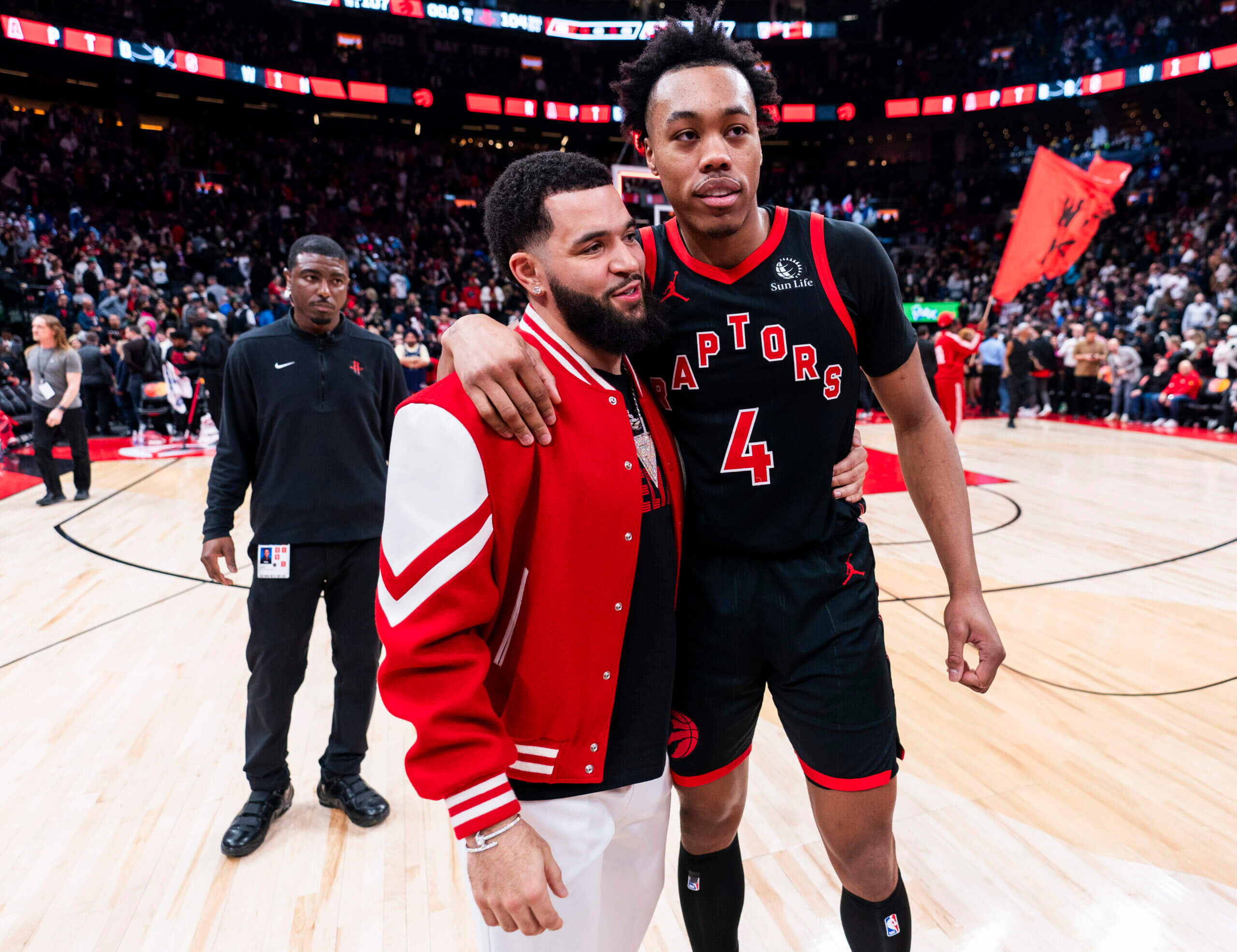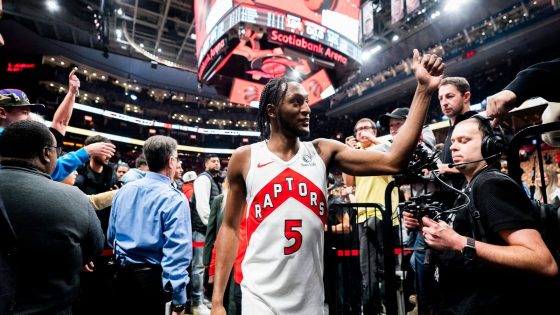So much for basketball never sleeping. August, aside from the Olympics and the WNBA, was deadly quiet.
The nights are getting cooler, though. It is time to turn our attention to the NBA and the Toronto Raptors. To that end, you guys came through for my mailbag call. As such, we’re splitting this into two parts. This part will deal with the past and the offseason, while the second will look toward this coming season and the future.
Thanks so much, as always.
(Questions have been edited for clarity and length, in part so I can answer as many as possible.)
The Past
Why didn’t the previous iteration of the Raptors work? Fred VanVleet was an All-Star signed for a hefty price and is currently seen as an amazing floor general. Pascal Siakam is being lauded these days at the peak of his career. OG Anunoby is considered an elite defender and a great 3-and-D wing who Knicks fans treat like a messiah. Plus we had Scottie (Barnes) who hadn’t even fully reached his potential. And Jakob Poeltl, who is a top-10 centre. Why was that not a good enough core to do some damage? What went wrong? — Menashe K.
Before we think about this coming season, let’s put a capper on the last few ones. I don’t think Poeltl is a top-10 centre, but everything else you say is true enough.
The easy answer is they had no driver of an efficient offence, which capped them at slightly above average. Either you need someone who bends the defence to his will or enough shooting around someone not quite at that level to provide more space to operate. Siakam and Barnes are great in many ways, but they aren’t those guys by nature or skill set. Combine that with a poor shooting season in 2022-23 from VanVleet, and that was that.
Beyond that, selfishness was an apt word from Masai Ujiri. It has been unfairly pinned on Siakam rather than the whole team. Siakam was trying to earn supermax status, but VanVleet was heading toward free agency, Anunoby was trying to prove his worth and has always yearned for a bigger role and Barnes was trying to establish himself as a burgeoning star. Add a lack of quality depth and a disconnect between the coach and management, and it was too much to overcome. A lot of people own some blame.
The consensus around the league appears to be that Masai and the front office have lost a step. Why do you think the perception has shifted so much? Are they really not as good as they were? — Jonathan C.
The perception has changed because the results have changed. They went from being among the best front offices at identifying and developing talent outside of the lottery to just another team, missing far more often than they hit, over the last half decade. That’s not perception; it’s fact.
That doesn’t mean they are suddenly bad. It is a reason for the front office to self-reflect and see if they have fallen behind on anything. That is something hard to declare from the outside but easier to assess when you are within the NBA ecosystem.
A thought: Joe Dumars won an executive of the year trophy in 2003 and his Detroit Pistons won the NBA title in 2004. He was the lead decision-maker for 10 years after that, a span capped off by five consecutive years missing the playoffs. I’m not saying that timeline or that stretch of losing should be the marker for all former championship executives. It is worth considering, is all.

The Offseason
A lot of negative media discourse has surrounded the Raptors regarding new contracts/extensions for Immanuel Quickley and Barnes. Do you think they overpaid? Were the Raptors’ hands tied to doing them the way that they did? What are the cap ramifications of these deals long term? — Matteo Z.
Criticizing the Barnes contract makes no sense to me. He’s a top-50 player who is 23. The deal is worth 25 percent of the cap, unless he makes All-NBA this year, which would bump it to 30. If that happens, great: It means he will have taken a leap forward and the Raptors probably exceeded expectations. Cade Cunningham, Evan Mobley and Franz Wagner got the same deals monetarily (the incentives are different in some cases). Reasonable minds can disagree, but I’d say Barnes has been the most consistent of that quartet through four years, with plenty of room for growth.
The Quickley deal came with some sticker shock. He is getting paid as if he is an averaging starting point guard despite starting just 65 games in his career. Beyond that, he has struggled in the playoffs, a concern for smaller guards.
I think Quickley can be an average starting point guard, even if he has not proven it yet. It is a reasonable target. Meanwhile, the cap will continue to rise (maybe by 10 percent per year, maybe a little less) and his salary is flat at $32.5 million per year.
There is risk, for sure. The contract is based on projection and the Raptors didn’t use restricted free agency to their negotiating advantage to get a cheaper deal (as many teams don’t). But I think a lot of the criticism is about the $162.5 million of it all rather than what that money means for the Raptors (or a team Quickley is traded to) in the future. If I had to bet, I’d say it ends up being a fair-ish deal.
The cap ramifications depend on what else happens. Poeltl’s contract goes through at least 2025-26 while RJ Barrett’s expires after 2026-27. The Raptors should operate as an above-the-cap, below-the-tax team until then. After? Impossible to say.
Can the combination of Jonathan Mogbo and Kelly Olynyk operate as a viable pairing at PF & C? — Anonymous
Not defensively, no. Let’s not put Jonathan Mogbo in the rotation just yet, either. He was the 31st pick in a weak draft. I don’t think the Raptors were considering his pairing with Kelly Olynyk when they drafted him, and nor should they have been.
Why have they not traded Bruce Brown yet? Do they think his value will go up? If they are trying to increase his value, should they put him in as the fifth starter? — Michael L.
Things don’t exist in a vacuum. Even if the Raptors don’t believe his value, on an expiring $23 million deal, will go up (and I don’t), Brown and his contract may yet provide the Raptors opportunities that haven’t been available yet. That might be unlikely, but if the offers aren’t overwhelming in the first place, what is the opportunity cost of holding on to a useful player? For what it’s worth, I have not heard teams were throwing first-rounders at the Raptors for Brown in the offseason or at last year’s deadline.
As for whether he should start or not, see the previous comment about vacuums. Brown is a connector, a player who can do a little bit of everything: shoot, handle, pass, defend capably. Those players often work best with dynamic offensive players. Then again, the Raptors have priorities unrelated to Brown — namely the development of Gradey Dick, Ochai Agbaji and Ja’Kobe Walter. Balancing all of that is an organizational task.
What are the chances to Raptors attach a first-round pick to Brown to try and make the Siakam trade look better (let’s call that The Dragić) and end up shooting themselves in the foot … again. — Nestor G.
Whether or not you agreed with the Goran Dragić/Thaddeus Young trade, you have to at least concede the Raptors knew they were getting a high second-rounder back for a mid-to-late first-rounder in that transaction. I also don’t think that deal was a way of making the Kyle Lowry sign-and-trade look better. It was to try to make use of an expiring contract to improve the roster. It was just short-sighted.
That is the key. I don’t expect the Raptors to be competing for a top-six spot this year, which means they should not have the incentive to make such a move. (No, you don’t need to remind me about the standings when the Raptors made the Poeltl trade.) Any deal they make will have to focus on the medium- or long-term future.
It’s possible the Raptors move some draft equity with Brown to improve the roster at some point. Let’s acknowledge the Raptors are in a very different place now than they were in 2021-22 and 2022-23. Moreover, it appears they have accepted that they are in that place. All of that makes such a move unlikely.
Did the Raptors do a good job of acquiring Darko Rajaković’s style of players this offseason with the options they had? — James R.
Dating back to last year, the Raptors have put an emphasis on both shooting and playmaking when acquiring players. Dick, Quickley, Brown, Olynyk, Walter and Mogbo are (or project to be) very good shooters or passers for their positions.
However, players don’t always fit as you’d think. Barrett has never been known as a plus shooter or passer, and he played some of the most efficient basketball of his career once he got to the Raptors. At this stage of the team’s growth, it would be silly to acquire players primarily because they fit within a playing style. Likewise, it would be wrong to become married to a specific style, as well as discount the possibility that young players can figure it out with the benefit of some time.
(Top photo of Immanuel Quickley: Mark Blinch / Getty Images)





